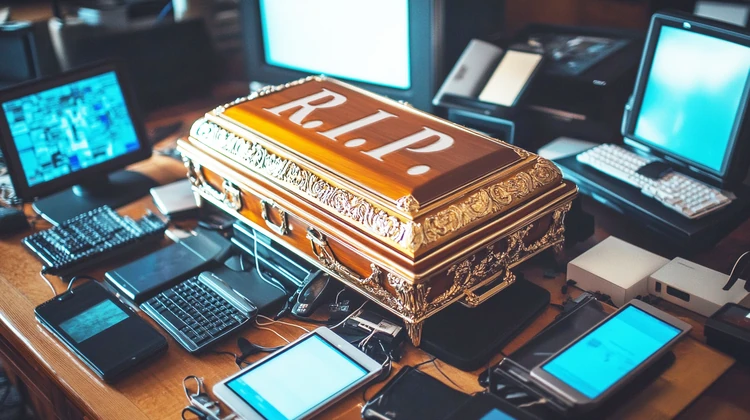You could leave your partner out in the cold literally

Odds are that you have a will. Odds are that youve determined who youre leaving money to, as well, and probably the house and jewelry, maybe your car. But the odds are that your digital assets key passwords, crypto wallets, investment portfolios, mobile banking passcodes, and even social media credentials are nowhere to be found in that will of yours.
You might not think thats such a big deal, but if you dont specify what happens to those, you might be leaving your heirs at risk: unprotected, locked out of things that youd want them to have.And depending on the state, not having your digital assets formalized could result ina costlier and lengthier-than-usual probate process.
Thousands of US adults were surveyed by All About Cookies to find out how prepared Americans are to pass on their digital inheritances, how many have even considered it, and even how much value Americans are leaving twisting in the wind in the worst-case scenario.
"Most people understand why making arrangements for your property is important, but conceptually its harder to realize that this applies to your digital life as well. So many important documents, accounts, and logins are stored online or in our heads, and we dont realize how crucial they are to the regular function of our lives, AllAboutCookies Digital PR Director Chris Lewis, told ConsumerAffairs.
How do you stack up?
Between a bank account, credit card accounts, Venmo, Paypal, Zelle, Cashapp, retirement, investing, and crypto - youre looking at tons of different logins and passwords, and those are just the financial accounts, Lewis said.
Add in everything you need for your home, utilities, medical, and online lives, and it becomes untenable. You may be able to make sense of it, but how easy would it be for someone else to untangle that mess?
Lewis said that everyone should think about their own situation, starting with their will. If youre like most (67%), you have a plan in place to share login or password information for their banking accounts in the event they pass away, but not necessarily in a formal will (only 24% said they did).
Then, theres another dilemma if you havent shared how to access your online account with your partner, which only 30% say they have. Add to that, 50% of married people have a median value of $8,000 in online accounts their spouse doesnt know about.
Reviewing the checklist
The researchers put together a pecking order of failed digital account safekeeping. At the top (61%) are digital estate accounts email, phone, computer passwords, and even password managers. All should be left with an heir in mind because all of these accounts will likely be necessary to settle someones estate.
Next are the credentials for bills or utilities (57% of the respondents). This is especially important for couples and people who live together. Think about the red tape your friend or loved one would have to go through to make sure the electricity stays on or that they aren't locked out of the Wi-Fi router.
Personal websites and business accounts were also low, with just 35% and 31% of respondents having made plans for these assets, respectively. Also think about side hustles that the deceased may have had going like on Etsy.
This category can be particularly thorny because online platforms require a lot of paperwork to prove who has the right to those assets.
For example, Google says it will make a decision only after a careful review that includes full name of the deceased, email address of the deceased, full name of the deceased's legal representation, relationship to the deceased, and death certificate.
Etsy, too, plays it pretty close to the chest and while it says it will work with you, it also says its unable to offer access to a deceased members account. Etsy says it also doesnt transfer accounts, so if you mom was earning some money with, say, bracelets that she made, its possible that her shop will be shut down completely and youll have to start all over again under another name.
Next in the pecking order of most forgotten items are banking accounts and apps with 1 in 3 Americans leaving their banking info unspoken for.
Finally, its hotel and airline rewards (31%). You might not consider them all that valuable, but there could be enough in one of those accounts to leave someone a nice trip.
And that crypto -- whoa!
While crypto accounts werent specifically surveyed in the study, they may be the biggest problem of them all. If you dont include a crypto account in your list of digital assets, they could become unclaimed.
Think about this:23.7% of all crypto assets on the market hundreds of millions of dollars worth are currently unowned due to a lack of proper inheritance planning.
How do you eat this elephant? One bite at a time
Most experts would agree that if youve got a handle on your passwords, that will go a long way in saving your heirs from any hassles. If you use Google, you can start by downloading all your passwords from Google Password Manager. The download is a spreadsheet file which is better saved as a digital file so the person youre trusting all this to can simply click or copy and paste into a browser. Apple also offers its Apple iCloud Keychain which allows users the ability to designate an heir directly from their phones.
Another option is a password manager a method recommended by Joseph Carrigan, Senior Security Engineer at Johns Hopkins University Information Security Institute.
I dont have a big problem with writing your passwords down and keeping them in a safe place, [but] I would recommend that people store any financial passwords in a password manager ... and securely store the master password and multiple off-line copies of the password manager file, he suggested.
Photo Credit: Consumer Affairs News Department Images
Posted: 2024-08-12 20:55:30




















